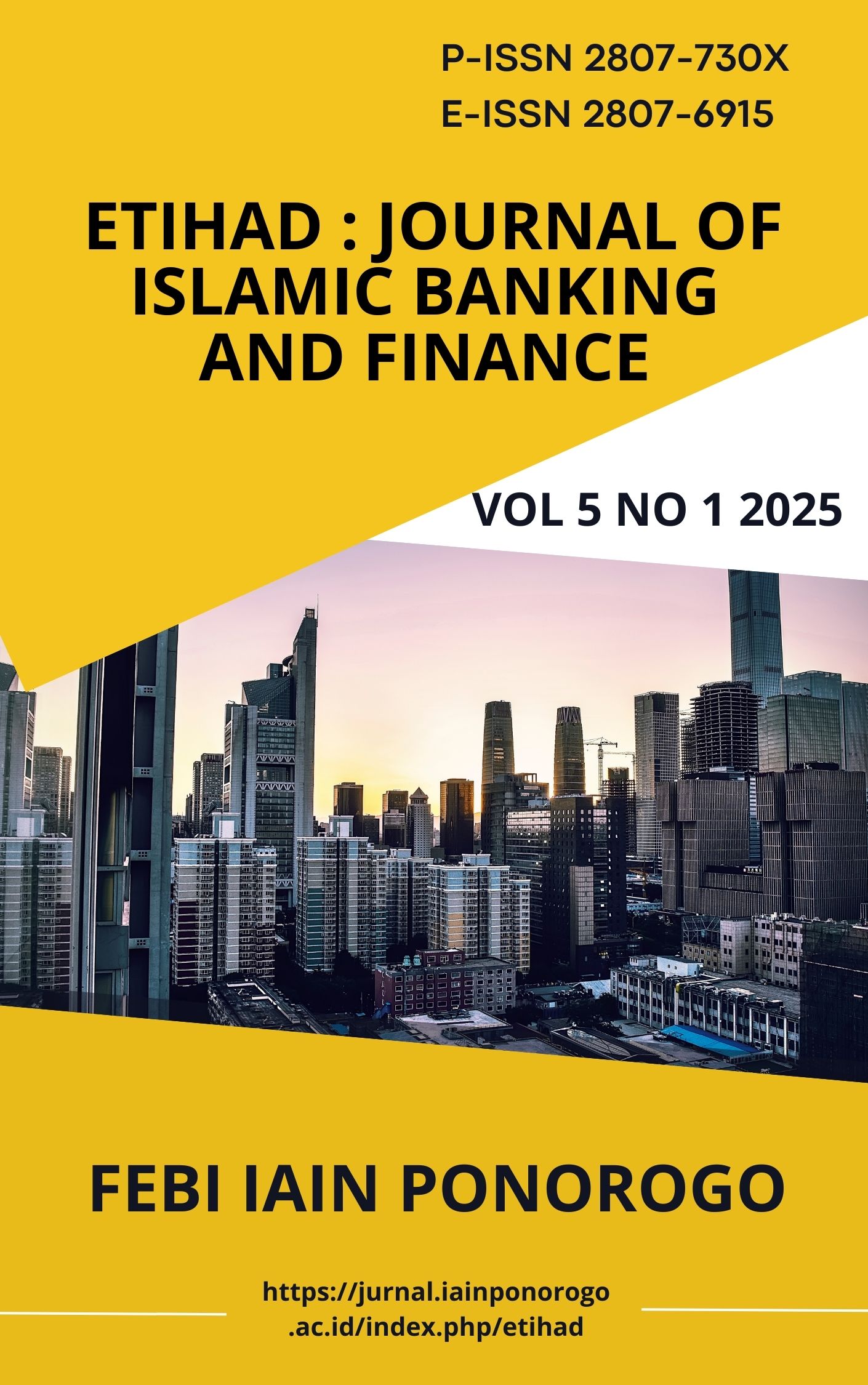Risk Management Framework in Zakat-Based Islamic Microfinance
DOI:
https://doi.org/10.21154/etihad.v5i1.12120Keywords:
Risk Management Framework, Zakat-Based Microfinance, AsnafAbstract
Introduction: This study explores the potential of utilizing zakat funds or their proceeds for microfinance initiatives by developing a robust risk management framework. The framework aims to ensure prudential use of zakat resources and align with Islamic ethical and operational principles to enhance the effectiveness of zakat-based microfinance in promoting socioeconomic empowerment. Research Methods: A qualitative approach is employed to analyze the use of Islamic financial contracts such as qarḍ ḥasan, muḍarabah, musharakah, salam, and ijarah in managing portfolio risks within zakat-based microfinance institutions. Results: The findings indicate that a structured risk management framework improves the financial stability and accountability of zakat-based microfinance institutions. It provides clear parameters for prudential management and helps safeguard zakat funds against potential losses. Conclusion: This study proposes a practical framework that helps zakat institutions balance financial sustainability with their mission of socioeconomic empowerment, enhancing transparency and resilience in zakat-based microfinance.
References
‛Usmani, M. S. (1978). Ma'arif al-Qur'an [The Understanding of the Qur'an]. Idarah al-Ma'arif.
Abu Dawud. (2009). Sunan Abi Dawud [Collection of the Sunan of Abi Dawud] (1st ed.). Dar al-Risalah al-‘Ilmiyyah.
Accounting and Auditing Organization for Islamic Financial Institutions (AAOIFI). (2015). Shariah Standard No. 35: Zakat.
Agha, S. E., & Sabirzyanov, R. (2015). Risk management in Islamic finance: An analysis from objectives of Shari’ah perspective. International Journal of Business, Economics and Law, 7(3), 46–52.
Ahmad Rida. (n.d.). Mu'jam Matan al-Lughah [Dictionary of the Text of Language]. Dar Maktabah al-Hayat.
Al-Ani, K. A. (1999). Masarif al-Zakah wa Tamlikaha fi Daw’ al-Kitab wa al-Sunnah [Recipients of Zakah and its Ownership in Light of the Qur'an and Sunnah]. Dar Usamah li al-Nashr wa al-Tawzi‘.
Al-Baghdadi, A. U. Q. S. (1968). Al-Amwal [The Wealth]. Maktabat al-Kulliyat al-Azhariyyah.
Al-Basri, M. A. A. (n.d.). Al-Mu‘tamid fi Usul al-Fiqh [The Reliable Source in the Foundations of Jurisprudence] (K. al-Mays, Ed.). Dar al-Kutub al-‘Ilmiyyah.
Al-Buthi, M. S. R. (1973). Dhawabit al-Maslahah fi al-Shari‘ah al-Islamiyyah [Controls of Public Interest in the Islamic Shariah] (2nd ed.). Mu’assasah al-Risalah.
Al-Ghazali, A. H. (1984). Al-Mustasfa min ‘Ilm al-Usul [The Essentials of Jurisprudence]. Dar al-Kutub al-‘Ilmiyyah.
Al-Ghufayli, A. A. M. (2009). Nawazil al-Zakah: Dirasah Fiqhiyyah Ta’siliyyah li Mustajaddat al-Zakah [Contemporary Issues in Zakah: A Jurisprudential Study].
Al-Juwayni. (1992). Al-Burhan fi Usul al-Fiqh [The Proof in the Foundations of Jurisprudence] (‘A. A. M. al-Dib, Ed.). Dar al-Wafa’.
Al-Khalidi, S. (1998). Al-Qasas al-Qur’ani: ‘Ard Waqa’i wa Tahlil Ahadath [Qur’anic Stories: Presentation and Analysis of Events]. Dar al-Qalam.
Al-Qaradawi, Y. (1969). Fiqh al-Zakah [Jurisprudence of Zakat] (Vol. 2). King Abdulaziz University.
Al-Zuhayli, W. (1984). Al-Fiqh al-Islami wa Adillatuhu [Islamic Jurisprudence and Its Proofs]. Dar al-Fikr.
Bank Indonesia, & The National Board of Zakat. (2018). Zakat Risk Management. Centre of Strategic Studies – The National Board of Zakat.
Braun, V., & Clarke, V. (2006). Using thematic analysis in psychology. Qualitative Research in Psychology, 3(2), 77–101.
Creswell, J. W., & Poth, C. N. (2018). Qualitative Inquiry and Research Design: Choosing Among Five Approaches (4th ed.). SAGE Publications.
Hopkin, P. (2018). Fundamentals of Risk Management: Understanding, Evaluating and Implementing Effective Risk Management. Kogan Page Publishers.
Ibtissem, B., & Bouri, A. (2013). Credit risk management in microfinance: The conceptual framework. ACRN Journal of Finance and Risk Perspectives, 2(1), 9–24.
Islamic Financial Services Board (IFSB). (2005). Guiding Principles of Risk Management for Institutions (Other Than Insurance Institutions) Offering Only Islamic Financial Services.
Mahadi, N. F. (2025). The integration of Islamic social finance towards accelerating economic development in Malaysia. El Barka: Journal of Islamic Economics and Business, 8(1), 128–134. https://doi.org/10.21154/elbarka.v8i1.12042
Morduch, J. (1999). The promise of microfinance. Journal of Economic Literature, 37(4), 1569–1614.
Obaidullah, M. (2008). Introduction to Islamic Microfinance. IBF Net Limited.
Shabbir, M. U. (1998). Istithmar Amwal al-Zakah [Investment of Zakah Funds].
‘Uwaydah, A. A. M. (2010). Nazariyyah al-Mukhatarah fi al-Iqtisad al-Islami [Theory of Risk in the Islamic Economy]. International Institute of Islamic Thought.
Van Tassel, E. (1999). Group lending under asymmetric information. Journal of Development Economics, 60(1), 3–25.
Zeller, M. (1998). Determinants of repayment performance in credit groups: The role of program design, intragroup risk pooling, and social cohesion. Economic Development and Cultural Change, 46(3), 599–621.
Downloads
Published
Issue
Section
License
Copyright (c) 2025 Nur Farhah Mahadi, Aznan Hasan, Azman Mohd Noor, Habeebullah Zakariyah

This work is licensed under a Creative Commons Attribution-NonCommercial 4.0 International License.
Etihad: Journal of Islamic Banking and Finance allow the author(s) to hold the copyright without restrictions and allow the author(s) to retain publishing rights without restrictions, also the owner of the commercial rights to the article is the author.







